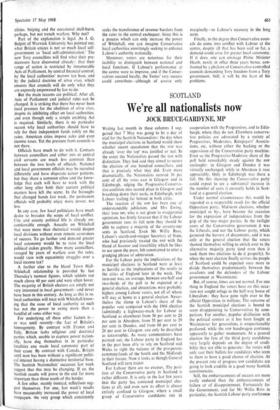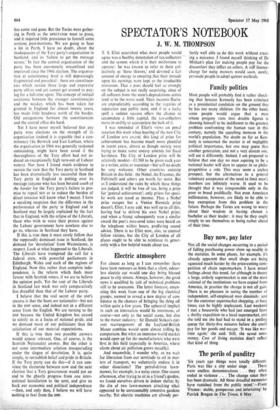We're all nationalists now
SCOTLAND JOCK BRUCE-GARDYNE, MP
Writing last month in these columns I sug- gested that 7 May was going to be a day of trial for the Scottish Nationalists: the day when
the municipal elections in Scotland would show whether recent speculation that the SNP was
already 'over the top' was justified or not. In the event the Nationalists passed the test with distinction. They had said they aimed to secure the election of one hundred councillors, and that is precisely what they did. Even more dramatically, the Nationalists secured 36 per cent of all the votes cast in Glasgow and in Edinburgh, edging the Progressive-Conserva- tive eoalition into second place in Glasgow and breathing down their necks in Edinburgh, with Labour trailing far behind in both cities.
The reaction of the SNP has been one of understandable jubilation, and Mrs Ewing. their lone MP, who is not given to exaggerated optimism, has firmly forecast that if the Labour government runs its full term they should be able to capture a majority of the seventy-one seats in Scotland. Even Mr Willie Ross, Labour's starch-and-vinegar Secretary of State, who had previously treated the SNP with the blend of hauteur and irascibility which he likes to use upon the press, felt constrained to utter a grudging phrase of admiration.
For the Labour party the implications of the municipal elections in Scotland were at least as horrific as the implications of the results in the cities of England later in the week. The turn-out was, on average, between one-half and two-thirds of the poll to be expected at a general election, and abstentions were probably highest among Labour voters, not all of whom will stay at home at a general election. Never- theless the slump in Labour's share of the popular vote compared with the 1966 election (admittedly a highwater-mark for Labour in Scotland as elsewhere) from 56 per cent to 28 per cent in Aberdeen, from 55 per cent to 29 per cent in Dundee, and from 60 per cent to 26 per cent in Glasgow. can only be described as catastrophic. As many commentators have pointed out, the Labour party in England has in the past been able to rely on Scotland and Wales to right the balance of the prosperous commuterlands of the South and the Midlands in their favour. Now it looks as though General Scotland will turn traitor For Labour there are no excuses. The posi- tion of the Conservative party in Scotland is rather different. It is only in the last few years that the party has contested municipal elec- tions at all; and even now its effort is almost entirely confined to Glasgow, where a small group of Conservative candidates run in
cooperation with the Progressives, and to Edin- burgh, where they do not. Elsewhere conserva- tive policies are advocated by a variety of Progressives, Moderates, Ratepayers' Associa- tions, etc, without either the backing or the supervision of the Conservative party machine. Even so the Progressive-Moderate share of the poll held remarkably steady against the SNP onslaught: in Glasgow and Dundee it was virtually unchanged, while in Aberdeen it rose appreciably. Only in Edinburgh was there a fall. On this showing the Conservative party could expect to see a substantial increase in the number of seats it currently holds in Scot- land at a general election.
Under normal circumstances this would be regarded as a respectable result for the official Opposition party. Mid-term elections, whether municipal or by-, have become the occasion for the expression of independence from the grip of the two major parties. In the twilight years of the Conservative government it was the Liberals, and not the Labour party, which garnered the harvest of discontents, and it was only at the general election that the voters showed themselves willing to switch over to the alternative majority party (and even then it took them two elections to do it properly). So when the next election finally arrives the people of Scotland could be expected once more to divide themselves predominantly between the assailants and the defenders of the Labour government at Westminster.
But, of course, times are not normal. For one thing in England the voters have on this occa- sion not sought refuge in the half-way house of Liberalism: they have gone right over to the official Opposition in millions. The outcome of the Scottish municipal elections is bound to seem disappointing to Conservatives by com- parison. For another, popular disillusion with the political contest as it has been fought at Westminster for generations is unquestionably profound, while the SNP bandwagon continues apparently to gather momentum. At a general election the fate of the third party candidates very largely depends on the degree of credi- bility they are able to generate : the voters will only cast their ballots for candidates who seem to them to have a good chance of election. At the present rate of progress SNP candidates are going to look credible in a good many Scottish constituencies.
Still, the embarrassments of success are more easily endured than the embarrassments of failure or of disappointment. Fortunately for the Government, and for Mr Willie Ross in particular, the Scottish Labour party conference has come and gone. But the Tories were gather- ing in Perth as the SPECTATOR went to press, and it required little prescience to foretell some anxious post-mortems. We are going to hear a lot in Perth, I have no doubt, about the inadequacies of the Tory party's organisation in Scotland, and its 'failure to get the message across.' In fact the central organisation of the party has been enormously streamlined and improved since the 1966 election. The organisa- tion at constituency level is still depressingly fragmented and parochial : there are constituen- cies which sustain three large and expensive party offices and yet cannot get around to pay- ing for a full-time agent. The concept of mutual assistance between the stronger constituencies and the weaker, which has been taken for granted in England for almost twenty years, has made little headway north of the border. Old antagonisms between the constituencies and the central office die hard.
Yet I have never myself believed that any party wins elections on the strength of its organisation (indeed it is arguable that a con- stituency like Berwick and East Lothian, where the organisation in 1966 was generally reckoned outstanding, might have been saved if the thoroughness of the Tory effort had not in- duced an exceptionally high turn-out of Labour voters). Nor have I found much evidence to sustain the view that the Tory party in Scotland has been dramatically less successful than the Tory party in England in putting over its message (anyone who has been berated south of the border for the Tory party's failure to pro- mise to repeal SET or to reduce the burden of direct taxation will know what I mean). I have a sneaking suspicion that the difference in the performance of the party in England and in Scotland may be largely explained by the fact that in England, with the eclipse of the Liberals, those who wish to voice their protest against the Labour government have nowhere else to go to, whereas in Scotland they have.
If this is true then it must surely follow that the supposedly dominant issue in Scotland, the demand for 'devolution' from Westminster, is suspect. Look at what happened to the Liberals. The Liberals have trumpeted the call for a federal state, with powerful parliaments in Edinburgh, Wales and each of the regions of England. Now this, rather than complete inde- pendence, is the reform which finds most favour with Scottish voters, if we are to believe the opinion polls. Yet the rout of the Liberals in Scotland last week was only comparatively less dreadful than that of the Labour party.
I believe that the real secret of the SNP'S success is that the Scots are nationalist—but not in the SNP sense, and indeed not in a different sense from the English. We are turning to the SNP because the United Kingdom has ceased to satisfy us as a focus of national pride, and we demand more of our politicians than the satisfaction of our material expectations.
If this is' true then two possible answers would appear relevant. One, of course, is the Scottish Nationalist answer. But the other is not some intermediate solution masquerading under the slogan of devolution. It is, quite simply, to reestablish belief and pride in Britain.
If the Tory party can do this—if it can con- vince the electorate between now and the next election that a Tory government would put an
end to the ghastly progress from one inter- national humiliation to the next, and give us back our economic and political independence —then, and only then, I believe we will have nothing to fear from the SNP.







































 Previous page
Previous page